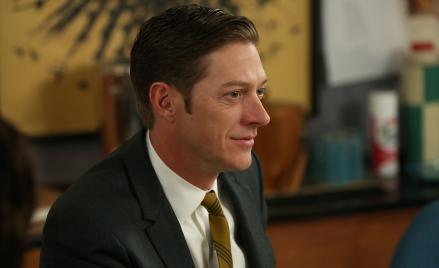Hanna, Seth,
It must be the Gatsby in the air, but as I watched this episode I came back to a line from F. Scott Fitzgerald’s “The Crack Up,” an essay he wrote about a nervous breakdown. “I had been only a mediocre caretaker,” wrote Fitzgerald, “of most of the things left in my hands, even of my talent.”
Talent is a slippery, mercurial thing. Without it a business like advertising can’t survive. Admit you have it and you’re an egotist; no one puts “talent” on their resume, or at least they shouldn’t. And yet businesses can’t survive without it—how to manage talent has been a corporate struggle for as long as there have been corporations. Witness the firestorm set off by this recent Harvard Business Review article, “Seven Rules for Managing Creative-But-Difficult People,” some of which is reflected in the article’s comments section. Talent is one of those pornography-like things that you know when you see it: always a problem, never quite solved.
Don’s power over others has its root in his talent; that’s been a recurrent theme of the show. Just as in the series premiere, this episode makes clear that without his ability to spin out advertising fantasias that plant themselves in our psychosexual nexuses he’s just another incredibly handsome sadist. And Hanna, now that you made the Christian Grey connection, I keep thinking about Don as a parallel Angel from Buffy—a handsome brute with awful secrets. In Don’s case it’s a secret identity; in Angel’s case a few centuries of vampirism.
In the arc of Buffy it was Angel’s oscillations between vampire-with-soul and plain-old-vampire that made him so compelling. When Angel was bad, that is, he was so very bad. But Don really isn’t very bad here. Oh, he tries to capture and possess Sylvia, but after a few days she throws the towel in. I mean, gosh, he took her book. It’s hardly killing Jenny Calendar.
And Hanna, you’re right. Don’s out of touch. Talent is a sensitivity to others, to the moment, the ability to take what’s happening and channel it. But Sylvia doesn’t want to fetch his shoes. And when she does, when she goes along to see what happens—nothing happens. All beast, no beauty. “Syrup pours,” Don says as he contemplates a campaign for margarine, “a smile comes over their Dorothea Lange faces.” Oof. Ted’s Gilligan’s Island method is silly but for God’s sake they’re selling butter substitute. It doesn’t need to be about the Depression.
Thing is, Ted just wants to do his job. He wants people to come to meetings and sharpen their pencils. He probably got into advertising because he liked advertising, whereas Don got into advertising because he saw the owner of a whorehouse mount his reviled stepmother after his drunkard father was kicked to death by a horse. So there’s that to work out.
Ted’s talent is that he can generate some ideas, run them through the Gilliganometer, and make people feel good about margarine. Don’s talent is that he can make people want to have sex with margarine so that in a brief moment of release they won’t feel the wrenching anguish of loss. I offer—Seth, feel free to disagree—that Ted’s relationship to margarine is ultimately the healthier one. God help me, I’d work for Ted in a minute. I’ve worked for Don.
Then there’s that grisly, humiliating “Please” as Sylvia readies to walk out. Just a second ago Don was essentially barking at Sylvia: Please me. But now it’s a pathetic imprecation. It’s his emotional safe word. Please let me keep controlling you. Nothing else will do. But it’s too late and time to go home, where Megan is just nattering on unheard as Don enters his fugue state.
Ted can fly a plane (and how great was that scene, just a bit of old-fashioned TV magic where they’re in the cockpit but we never see the plane). Ted even gives up his chair to a lady. Don, meanwhile, gets drunk and extemporizes on loss and yearning. Since last night I’ve been wandering around the apartment riffing on everything I see in a Draperish voice, like we used to do on Tumblr: “A rainy day, wind blowing. A child enters a warm, dry home. A man says, ‘They hold out the world. And they hold in love. Walls.’”
Parallel to Don, Pete is imploding ever further. Don has flashbacks, but Pete actually pays for his transgressions with his flesh-and-blood mother showing up in his sex pad. Both of these men are watching their fantasies unravel, and the pleasure they expected as their due is no longer crediting to their accounts. But goofy, awkward Ted, whom we thought was a beta player in comparison with the silverbacks of SCDP, is winning, partly because he doesn’t need to dominate everything, all the time. Don could learn something here. If Don is capable of learning things.
Much was made in passing the New York State Thruway account, which makes me wonder if the newly-combined agency will come into direct contact with Henry Francis, and Don will be forced to pitch business to the man who stole his wife. (Don Draper, 1997: “It’s a way forward when the world is going backwards. It’s a passport that brings you from one realm to another. It’s called … EZPass.”)
Talent is interesting because at some level the only reward for talent is more work, the chance to apply the talent further. If Ted can generate ideas more quickly, with more efficiency, and Don remains stuck in his Depression-era vignettes, will he become another Roger, cut off from the day-to-day that ultimately is the source of his energy? He runs the risk, for he’s become a mediocre caretaker of his own talent. F. Scott Fitzgerald died at 44 of a heart attack. At the time of this episode Don is about 42.
Doesn’t ice count?
Paul
